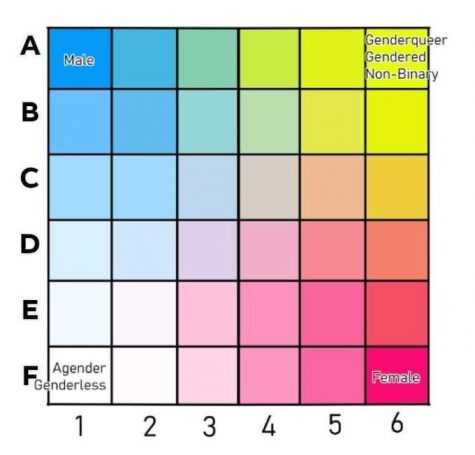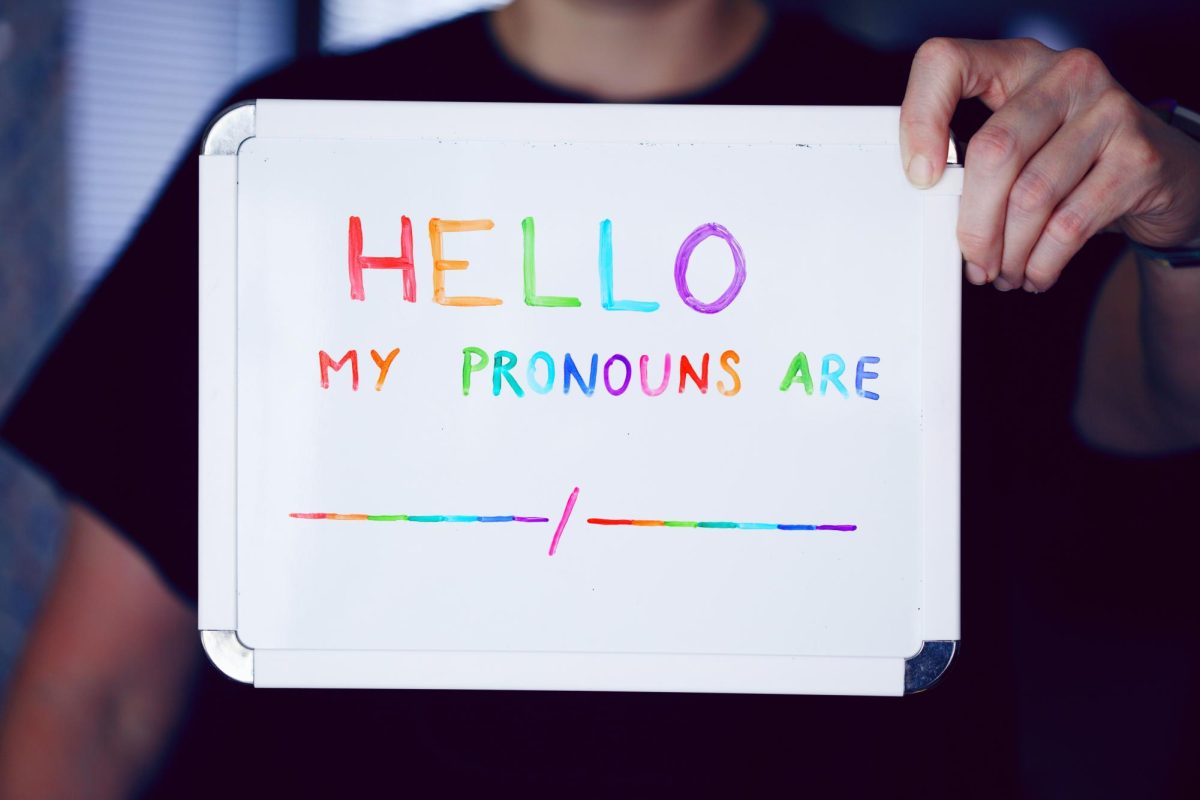Pronouns and Gender Neutral Terms (And Why They’re Important)
Brought to You By GSA

We use pronouns every day, in school and out of school, but how do they impact mental health? Trans students may often face misgendering and/or dead naming which has been proven harmful to their mental health. This quote highlights the dangers of misgendering: “Although youth who identify as a gender other than the one assigned to them at birth have among the highest rates of suicide, depression, and self-harm, a supportive and safe environment can significantly reduce these risks.” https://www.childtrends.org/blog However, there are ways to prevent this AND be an ally. Putting your pronouns in your Zoom name can not only prevent misgendering, but also show that you support the transgender community. So, how do you change your Zoom name? Here’s a slide show.
It is especially important for teachers to put their pronouns in Zoom because this shows that their class/Zoom room is a safe place for all. Another important way to prevent misgendering and dead naming is for teachers to ask for names and pronouns at the beginning of the school year when everyone is getting to know each other. Even if the teacher doesn’t ask for pronouns, students should still get into the habit of introducing themselves with their pronouns. Now, say you accidentally misgender someone and you’re not sure what to do next. All you have to do is apologize and correct yourself. Don’t make a big deal of it because this can make the individual feel uncomfortable. If you are ever unsure of someone’s gender or pronouns, just ask; it’s better than misgendering someone.
There are a few more ways you can be gender inclusive: when referring to someone that another person is in a relationship with, you can say “Partner” or “Significant other.” When you address a group of your friends instead of saying “hey guys,” you can say “Y’all” or “Everybody.” It’s better to say gender-neutral terms because then you don’t exclude people who are gender-neutral. For example, you can say “firefighter” instead of “fireman/firewoman.” Some more gender-neutral terms that you can use are “friends,” “folks,” and “students.” It is also important to avoid addressing people as “sir” or “ma’am” because presenting as masculine or feminine does not take away from a person’s identity. For example, a person who is non-binary does not have to present as androgynous.
In addition, gender-neutral bathrooms are controversial, but honestly, they are reasonable and necessary. It is good to be mindful to use bathrooms that you identify with. Occupying a gender-neutral bathroom might be inconsiderate for nonbinary people because that bathroom might be their only option. It should also be important for Bancroft to have more gender-neutral bathrooms. Currently, there are only two gender-neutral bathrooms: two in the Library, and two backstage in the Theater. If a student who uses a gender-neutral bathroom has a class in the English Wing and has to go to the bathroom, they would have to walk all the way to the library which would result in more class time being taken away where they could have learned important information.
By now you’re probably wondering the definitions of the genders and other gender terms, here is a simplified list below:
- Male
- Female
- Gender-neutral (Non-Binary)- does not identify as either male or female
- Genderfluid- changes in between genders
- Bigender- identifies as two genders
- Pangender- identifies with all genders
- Demiboy/Demigirl- identifies partially as a boy or girl but not fully.
- Agender- does not have a gender
- Transgender Woman- A woman who transitions from male to female
- Transgender Man- A man who transitions from female to male
- Cisgender- the gender you are born with
Be mindful with peoples’ names and pronouns by preventing:
- misgendering- referring to someone as the wrong gender (which is why knowing pronouns is important).
- deadnaming (very insulting)- calling someone by their birth name that they have since changed due to their gender identity (such as transgender or non-binary).

Steps to becoming an ally
Educating yourself on the LGBTQ+ community is the first step to becoming an ally. The next step is to speak up. If you see someone being inconsiderate, deliberate or not, speak up. Gently remind them that their actions are being insulting, and if they persist, speak to a trusted adult. The third step is to support friends and families if they come out. Make sure you can provide a safe place to talk if needed. The fourth step is to be sympathetic and understanding to the community. Understand that the LGBTQ+ community faces discrimination that goes beyond violence and hate crimes. Understand that it is a sensitive topic for some people. Also, please understand that not all people think the same. Just because someone is in the LGBTQ+ community does not mean that they all think the same. Some people might be offended by certain things while others may not. That’s why it is always important to ask questions! Asking questions is a step all of us need to work on. Things are not set in stone. The world is constantly changing, which is why we should be changing, growing, and learning as well.
Now you took the first step to becoming an ally of the LGBTQ+ community by educating yourself with this article– yay!!! Educating yourself on different communities, even when they might not seem to pertain to you is still important. We appreciate YOU, the reader, taking the time to read this article and educate yourself on an important topic. Thank you!
More Gender Neutral terms for everyday use
For romantic relations:
- “Partner”
- “Significant other”
- “pair”
Referring to a group of people:
-
- You all / Y’all
- Everybody
- Friends
- Folks
- Students
- Group
- Gang
- Team
- Crew
- Colleagues
- Peers
- Learners/teachers
- Crowd
- Community
- Instead of “fireman/firewoman” someone can use “firefighter”
- Please try avoiding terms like “guys/ladies and gentlemen”
Photo by Alexander Grey on Unsplash



Sonia Patil • Dec 18, 2020 at 9:59 AM
This was a great article; it helped open my eyes as to why pronouns are important.
Isabel Urban • Dec 18, 2020 at 9:51 AM
This was a great article; thank you for educating us!
Mrs. Sheldon (she/her) • Dec 15, 2020 at 3:19 PM
Great article! And helpful to know simple things we can do that make such a difference.
Ms. Moon • Dec 13, 2020 at 11:05 AM
This a fabulous, helpful article. So many people want to be better about using inclusive language but don’t know how – thanks for helping all of us be better allies.
Darren Belanger • Dec 12, 2020 at 10:03 AM
Go team! It’s just Darren (he/him) here to tell you guys that this was a wonderful article!
Elisa Heinricher • Dec 11, 2020 at 3:53 PM
This is a well-written article and a good reminder to us all to take time to learn about the people we see and interact with every day.
ava • Dec 11, 2020 at 2:48 PM
This is awesome, Riley and Audrey!! You both wrote such an important message so beautifully, well done!
Paul Belanger • Dec 11, 2020 at 2:43 PM
This has a wonderful tone and good information. I feel like I have been informed without being talked down to. Thank you so much for taking the time. I’m sure I will make mistakes and forget, but this helps me to keep trying. It’s worth it!
Chris Sheldon • Dec 11, 2020 at 2:28 PM
Riley and Audrey, Nicely done. Lots of good information.
Just a note, “Cisgender” refers to a person whose gender and identity matches their birth sex, not just “the gender you are born with” because that gender may not match your birth sex.